Gaza
With a fragile ceasefire between Israel and Hamas in place, it is tempting for many in the West to ignore the broader issues that Palestinians still face: Namely, increased settler violence and the state of Israel annexing more Palestinian land. I went to Palestine in August, while the war that was not a war still raged, and I saw firsthand the dire reality of Palestinians in the West Bank.
In Palestine, we welcomed the news of a ceasefire with hope—a fragile, trembling hope. After months of unbearable horror, we allowed ourselves to exhale. For the people of Gaza, it meant a pause in the killing, a night of uneasy quiet, and the possibility of sleep without bombs.
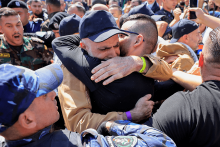
Joyous Palestinians rushed to embrace prisoners freed under a U.S.-brokered ceasefire agreement as they arrived by bus to the occupied West Bank and Gaza on Monday.
The prisoners were released after the Hamas militant group freed the last 20 living hostages taken during the Oct. 7, 2023, attacks that precipitated the war in Gaza.
Under the deal, Israel is set to release 250 Palestinians convicted of murder and other serious crimes as well as 1,700 Palestinians detained in Gaza since the war began, 22 Palestinian minors, and the bodies of 360 militants.
Several thousand people gathered inside and around the Nasser Hospital in Khan Younis in the southern Gaza Strip, awaiting the arrival of freed prisoners, with some waving Palestinian flags and others holding pictures of their relatives.
Fighting back tears, one woman who asked to be identified as Um Ahmed said she said that despite her joy at the release, she still had “mixed feelings” about the day.

For as long as Lecrae has been a public figure, he has been a lightning rod for white evangelical racism.
A spearhead for the movement that turned Christian hip-hop from a misfit genre to a powerhouse industry, Lecrae has consistently endured racism thinly veiled as theological critique. While he was earning deep respect from hip-hop luminaries—Sway In the Morning and Kendrick Lamar, for example—he was fighting a Christian industry that only begrudgingly came to accept that CHH was here to stay.
Early on, critics claimed “Christian” and “hip-hop” were contradictory terms, and Christian rappers like Lecrae were putting godly messages second to godless culture. Then, as the U.S. began another reckoning with racist police violence, Lecrae was accused of division, partisanship, and putting “political issues” like racism before “biblical issues” like abortion. When he attempted dialogue, white pastors told him to his face that chattel slavery was a “white blessing.”

The Committee to Protect Journalists has estimated that since Israel’s war with Gaza began in October 2023, Israel has killed 235 journalists and imprisoned another 86. According to CPJ, this has been the deadliest period for journalists since they first began collecting data in 1992.
In August, at least 20 people were killed in an Israeli attack on Nasser Hospital in southern Gaza. According to MSNBC, Israel struck the hospital at least four times, killing journalists, health workers, and emergency response personnel, many of whom were responding to the initial round of bombings.

Last weekend, I visited my home state of Illinois to attend the Church at the Crossroads conference, which was held at Parkview Community Church in Glen Ellyn. Conference organizers estimated that 580 attended in person and 300 more joined virtually. The conference was convened to encourage American evangelicals to listen to Palestinian Christians and to confront and correct those who use scripture to “justify war, occupation, or silence” in the face of the escalating violence in Israel and Palestine.
Practically speaking, though, what was the point of this shindig?

AS WE NEAR the second anniversary of the Oct. 7 Hamas attack on Israel, we don’t forget the hundreds killed that day. Neither do we dare look away from the cascade of human rights abuses Israel has unleashed upon the Palestinian people since. As Mae Elise Cannon and Ben Norquist report, this ongoing war has even turned water into a weapon — and the people of Gaza are dying of thirst.
The late theologian and longtime Sojourners contributor Walter Brueggemann would remind us that we have alternatives. A poll in July showed that 74% of Israelis back an agreement with Hamas that would release all hostages at once in exchange for an end to the war on Gaza. In May, 600 Israelis led an anti-war protest along Israel’s border with Gaza. In the U.S., college students have led the largest anti-war demonstrations seen in years, despite a targeted smear campaign to label pro-Palestinian groups as “terrorist support networks.” We can be conscientious objectors to war profiteering and join with Palestinian American memoirist Sarah Aziza in conspiring against the forces of destruction and erasure to relentlessly pursue life.

The Fantastic Four: First Steps starts out with a trade proposal of the highest stakes. Galactus, the world-eating villain of Marvel’s latest reboot, will spare the Earth from his insatiable hunger in exchange for one child.
The child on the cosmic bargaining table is Franklin, son of Reed Richards, aka “Mister Fantastic” (a subdued Pedro Pascal) and Sue Storm, aka “The Invisible Woman” (Vanessa Kirby, who really gets to shine as the Fantastic Four’s leader).
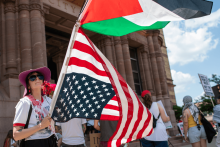
We also need to be clear: Iran did not possess a nuclear weapon. Iran was enriching uranium needed for such a weapon and had recently increased its production, but intelligence assessments concluded they had not made a final decision to produce a bomb. In fact, the assessment said Iran would be more likely to produce a weapon if the U.S. attacked its uranium supply.
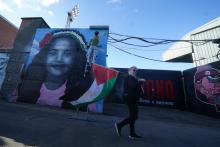
I went on a trip to the American South with the Telos Group, a nonprofit dedicated to equipping people to advocate for peace and reconciliation amid conflict. The purpose of the delegation was to help Palestinians learn about the histories and current realities of the Black and Indigenous struggle for justice in the United States.

PANKAJ MISHRA OPENS The World After Gaza: A History with the 1943 Warsaw ghetto uprising in German-occupied Poland. The Jews imprisoned in the ghetto fought their Nazi captors for “a few desperate weeks” until they were crushed. Mishra quotes one of few survivors, Marek Edelman, who “was ‘terribly afraid’ that ‘nobody in the world would notice a thing,’ and ‘nothing, no message about us, would ever make it out.’”
The Israel Defense Forces’ ongoing destruction of Gaza following the Oct. 7, 2023, attack on Israeli civilians by Hamas has been livestreamed by journalists, mothers, and teenagers. Globally, many suffered “an inner wound,” Mishra writes, from watching these cruelties: Israel’s bombs targeting children, schools, and hospitals; military dogs mauling disabled Palestinians; and IDF soldiers denying starving people access to food. Despite Palestinian efforts to broadcast the war crimes, Gaza still burns. Mishra contrasts reactions to the atrocities in 1943 Warsaw and in Gaza today to explore Western state-sanctioned violence.
Although Western Allies pledged never to let the genocide of the Holocaust happen again — a promise that has defined Western morality for decades — the violence unleashed in World War II death camps has been repeated across the globe in Japan, Vietnam, Rwanda, Iraq, Syria, and Gaza.
Mishra, a British Indian writer, links the rhetoric of Israel’s ethno-state to the Hindu nationalism of his native India. From a Hindu Brahmin family, Mishra recalls his childhood admiration of Israel’s leaders and how he, and many other Hindu nationalists, admired their macho tactics.

A SMALL TREE grows near the parking lot at a state park close to my home. I noticed this tree more than a decade ago when our children were very small: A sapling rooted in the crack of a giant boulder.
Over the past 14 years the split in the boulder has widened. As the tree has gotten a little taller and broader, the rock has gradually changed its shape, splitting and cracking. The tree’s bark folds around the rock; the two have become inextricably bound up with one another.
Social transformation can be slow, quiet work, like roots pushing their way through rock. It’s often hard to see the impact your life, your work, your presence, your art, your words are making on the impenetrable forces around you. Ask me to move a two-ton rock and I’ll laugh in your face; it's impossible. And yet, I remember that little tree.
Extremely heavy forces are at work in this world: racism, misogyny, greed, violence. And yet people keep finding ways — like that tree growing down into stone — to stay rooted, find joy, grow, even thrive. What if the response to these very real and very heavy stones threatening to crush our humanity is not a sledgehammer but a sprout?
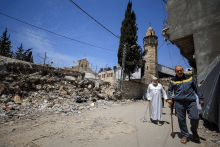
Francis called the church hours after the war in Gaza began in October 2023, Antone said, the start of what the Vatican News Service would describe as a nightly routine throughout the war. He would make sure to speak not only to the priest but to everyone else in the room, Antone said.

Peter Beinart, author of Being Jewish After the Destruction of Gaza, rejects the idea that the liberation of Palestine is an antimsemitic project. In fact, he argues that Zionism has become an idol for some Jewish leaders, and advocating for Palestinian people
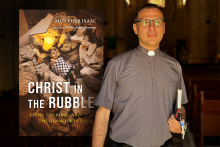
In ‘Christ in the Rubble,’ Palestinian pastor Rev. Munther Isaac surveys the devastation of his homeland and finds God in the most unexpected places.
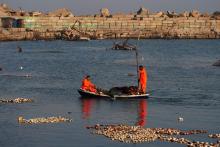
In the halls of empire, men sit at gleaming tables untouched by war, they speak of peace as though it is theirs to grant. But they have never gathered their children into one room to sleep at night so that if death comes, it takes them together. They have never watched the sky split open with fire, felt the air convulse after the blast, felt the wind howl past — hot, violent, and thick with the dust and scent of obliteration. And yet, they sign their names to ceasefires, shake hands, and expect the world to applaud. They do not blush as they bankroll the demolition of homes, the bombing of hospitals, and the erasure of entire families .
During the first week of February, U.S. President Donald Trump hosted Israeli Prime Minister Benjamin Netanyahu, whois the subject of an International Criminal Court arrest warrant for committing war crimes and crimes against humanity. This meeting took place as the fragile ceasefire agreement between the Israeli occupying forces and the Palestinian militant group, Hamas, hung in the balance. Trump, never one to concern himself with the nuances of international law (or any law, really), originally floated the idea of the U.S. “owning Gaza” on Feb. 4 and then has since doubled down on this colonial fantasy, one so crude and reckless that his own administration scrambled to downplay it.
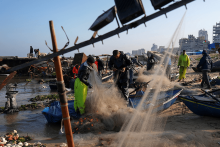
Amid the fragile ceasefire, the exchange of hostages, and the temporary pause in Israel’s genocidal onslaught against Gazans, nearly six hundred Christians huddle together in one of Gaza’s battered churches, their prayers rising above the rubble as a defiant testament to their faith and resilience. Among them, Gazan Christian George Antone boldly declares, “For us, as Christians, we are not leaving Gaza. We will remain in Gaza and help people in Gaza reconstruct their houses, rebuild the streets. Yes, we will stay in Gaza. We are not leaving.”
Antone’s words stand in stark contrast to the explosive press conference at the White House on Feb. 4, when President Donald Trump brazenly suggested that the United States should “effectively own” Gaza, proposing to turn it into a real estate venture while displacing Palestinians from their homeland and relocating them to neighboring countries.
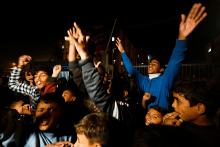
Israel and Hamas agreed to a deal to halt fighting in Gaza and exchange Israeli hostages for Palestinian prisoners, an official briefed on the deal told Reuters on Wednesday, opening the way to a possible end to a 15-month war that has upended the Middle East.

When I visited Rev. Munther Isaac in Bethlehem, the West Bank, in October, he mentioned that he was previously opposed to liberation theologian James H. Cone. Isaac was trained in theologically conservative teachings, growing up in a conservative church and then leaving Palestine to attend a conservative seminary in the U.S.